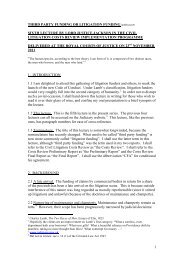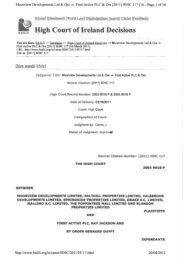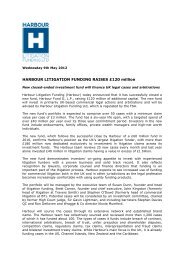Document 2 - Harbour Litigation Funding
Document 2 - Harbour Litigation Funding
Document 2 - Harbour Litigation Funding
You also want an ePaper? Increase the reach of your titles
YUMPU automatically turns print PDFs into web optimized ePapers that Google loves.
Report on SCLF Autumn Event<br />
11 October 2012<br />
Competition <strong>Litigation</strong> in Scotland - Impact of Proposed BIS Reforms<br />
The SCLF Autumn Event proved popular with a large number of practitioners and academics who had<br />
to brave the foul weather in Edinburgh to participate in a roundtable discussion on the impact of the<br />
proposed BIS reforms in Scotland.<br />
Introduction from Iain Mansfield, BIS<br />
The evening’s discussions began with an introduction from Iain Mansfield, an Assistant Director of<br />
Competition Policy at the UK Government's Department for Business, Innovation and Skills (BIS).<br />
Iain explained that the proposals are designed to encourage more private actions, both to help<br />
business, and especially SMEs, to challenge anti-competitive behaviour and to help consumers and<br />
business obtain redress if they have been victims of cartels or other forms of anti-competitive<br />
business practices.<br />
Iain provided an insight into the feedback received to the BIS consultation on the proposed reforms<br />
published earlier this year. The consultation received 128 responses, however, 45 of the respondents<br />
only responded to two questions, those being expanding the role of the Competition Appeal Tribunal<br />
(CAT) and the approach to take when distributing unclaimed sums following an award of damages<br />
(over half of the responses favouring distribution to Access for Justice).<br />
The majority of respondents were in favour of expanding access to the fast track system to SMEs.<br />
Iain however explained that the most controversial of the proposals was the possibility of an “opt-out”<br />
system for collective actions - over half of respondents did not express a view and the ones that did<br />
were fairly evenly split between for and against an opt-out regime.<br />
Iain concluded by identifying the aspects of the reforms that would have ramifications for Scottish<br />
competition litigation. Of note was the potential for claimants to choose between jurisdictions to seek<br />
a particular remedy, for instance interdict over injunction. It was also suggested that the government<br />
may have to consider applying a universal limitation period for competition law claims, thereby<br />
removing the current time differences between England and Scotland.<br />
Roundtable discussion<br />
Professor Barry Rodger then chaired the discussion, inviting contributions from Mr Justice Barling<br />
(President of the CAT), Heriot Currie QC, Graeme Young of Dundas & Wilson, Julia Clarke of Which?,<br />
Stephen O'Dowd of <strong>Harbour</strong> <strong>Litigation</strong> and Dr. Till Schreiber of Cartel Damages Claims.<br />
The panel were generally all in favour of the expanded role of the CAT and the introduction of some<br />
form of opt-out regime for collective actions. Views were unsurprisingly mixed though on the scope<br />
for more competition litigation in Scotland, whether before the CAT or the Court of Session.<br />
The most ardent advocates of an “opt-out” system came from to two very different quarters. Mr.<br />
Justice Barling, President of CAT, expressed the view that implementation of an opt out system was<br />
only solution to the current problems associated with providing justice to consumers who may have<br />
been victims of a cartel. These views were echoed by Julia Clarke of Which?, though Julia stressed<br />
that Which? would like to see an expansion of an opt-out collective redress regime for a range of<br />
consumer issues, not just competition law based claims. She also stated that Which? would support
the OFT being charged with fronting such claims as part of its consumer protection role, similar to the<br />
regimes in Denmark and Norway.<br />
Mr. Justice Barling cautioned against some other more specific aspects of the proposals including<br />
introducing a rebuttable presumption of loss in cartel cases and any relaxation of joint and several<br />
liability of cartel members. There was also discussion on the differing limitation periods for civil claims<br />
in Scotland compared to England and Wales.<br />
As regards interdict, Heriot Currie QC thought that the Commercial Court in Scotland has a fairly good<br />
track record in dealing with interim relief, citing the recent unreported Lothian Buses / Edinburgh<br />
Airport case, and that an alternative option to obtain interim relief from the CAT may not have a big<br />
impact.<br />
Graeme Young thought that it would be important for the CAT to be able to grant interim orders in<br />
Scotland. This might help give practitioners more confidence in bringing claims, knowing their case<br />
would be heard by a specialist judge. Beyond this he thought extending the jurisdiction of the CAT<br />
might not lead to many more standalone damages claims, but that the collective opt-out regime was<br />
likely to be much more attractive for the larger follow-on claims. To be effective though there also<br />
needed to be some established system for collective settlements, perhaps something similar to the<br />
Dutch model. This would be in the interests of both claimants and defendants. Graeme cautioned<br />
against a potential confusion of the public enforcement role of the OFT (and the future CMA) and any<br />
role it might be given to encourage or facilitate follow-on claims.<br />
The general sentiment of the panel was that whilst any reform that increases protection of consumers<br />
and SMEs, such reforms should not come at the expense of the already established mechanisms in<br />
place in Scotland. With the Scottish Government considering proposals on collective redress, these<br />
issues will dominate discussions for some time to come.<br />
Stephen O'Dowd and Dr. Till Schreiber gave us an overview of their organisations and their activities<br />
in respect of competition litigation. Stephen outlined the options for clients when considering funding<br />
litigation and the market and different models for litigation funding (which go much further than just<br />
funding competition litigation). <strong>Harbour</strong> is currently funding at least three competition claims, two<br />
follow-on and one abuse of dominance claim. <strong>Harbour</strong> does not take full control of the claim. It<br />
charges a % of proceeds, but subject to a floor equal to a multiple of the monies actually spent by<br />
<strong>Harbour</strong>. The client however pays nothing if the case is unsuccessful. Dr. Till Schreiber outlined the<br />
different model operated by CDC. CDC effectively buys up multiple from a number of victims of a<br />
cartel (SMEs but also large corporates) and bundles them together to pursue them in its own name.<br />
This type of 'book-building' provides interesting opportunities for external investors to fund claims that<br />
might otherwise have been individually too small to pursue.<br />
We then had time for some Q&A, with some interesting contributions from the floor, including some<br />
thoughts on the reasons for the relatively low number of private actions before the Scottish courts<br />
from Catriona Munro of Maclay, Murray & Spens, and some reactions from Lord Hodge, Principal<br />
Commercial Judge at the Court of Session, on the practicalities of dealing with and managing<br />
competition cases in the Scottish courts. The discussion then concluded with drinks at Dundas &<br />
Wilson's offices.<br />
The next SCLF event is on 'Competition Law and the Individual' on 21 November 2012.



![Neutral Citation Number: [2010] EWHC 941 (QB) - Harbour ...](https://img.yumpu.com/47188668/1/190x245/neutral-citation-number-2010-ewhc-941-qb-harbour-.jpg?quality=85)
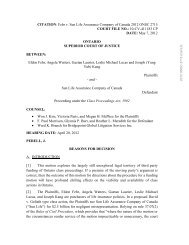
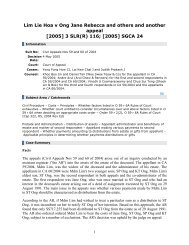
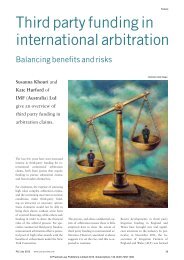
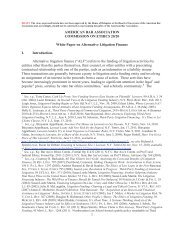

![Hall v Poolman [2009] - Harbour Litigation Funding](https://img.yumpu.com/37488843/1/190x245/hall-v-poolman-2009-harbour-litigation-funding.jpg?quality=85)
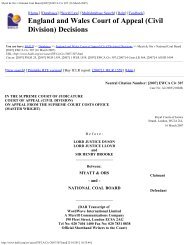

![[2013] SGHC 135 - Singapore Law Watch](https://img.yumpu.com/37488807/1/184x260/2013-sghc-135-singapore-law-watch.jpg?quality=85)
